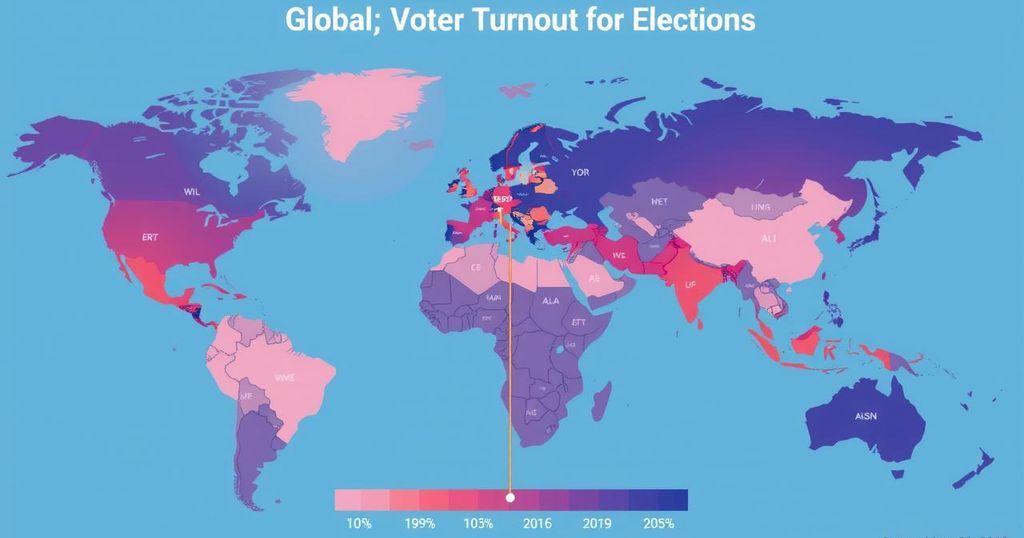Global Democracy in 2024: A Year of Voter Trends and Political Shifts
In 2024, over 60 countries held elections engaging nearly half the global population, revealing a trend towards self-interest in voting. Economic concerns took precedence over issues like climate change domestically and internationally, impacting outcomes in major democracies. Incumbent leaders faced backlash, illustrating a shift towards traditional parties. Notably, Russia highlighted a distortion of democratic principles. The implications of these elections pose significant questions for the future trajectory of global democracy.
The year 2024 witnessed a significant surge in voter engagement, with over 60 countries—representing nearly half of the global population—participating in democratic elections. However, the outcomes reflected a prevailing trend of self-interest, often prioritizing immediate concerns over collective prosperity. For instance, in the United Kingdom, economic issues catalyzed a shift in power from the Conservatives to Keir Starmer’s Labour Party, suggesting a resurgence of trust in traditional parties over populist alternatives.
Notably, issues like climate change failed to dominate electoral discussions, as economic anxieties overshadowed them. This was illustrated in the United States, where President Biden, despite reducing inflation, faced voter backlash. His perceived failure to enhance personal economic circumstances led to Donald Trump’s return as a significant player in American politics. The trend was apparent worldwide, as voters increasingly prioritized economic wellbeing, often resulting in the ousting of incumbents.
The elections also showcased varied results globally, with significant shifts seen from Bangladesh’s political upheaval to Brexit’s continuing ramifications in the UK. Yet, what stood out were the elections in major democracies like France and India, where leaders like Emmanuel Macron and Narendra Modi found their popular support dwindling, reflective of voters’ discontent with their economic performance.
In contrast, the recent presidential election in Russia, where President Putin claimed an overwhelming 87% of the vote amidst allegations of repression, serves as a stark reminder of the distortions that can arise within voting frameworks. Furthermore, the dynamics of Trump and Putin’s potential partnership are poised to influence international politics, particularly concerning Ukraine, an issue exacerbated by ongoing conflict.
While the democratic experiment displayed remarkable engagement in 2024, the lessons learned underscore a global shift in electoral behavior driven by economic priorities over long-term collective goals. In this context, the experiences of emerging democracies, such as Syria, highlight the continuing relevance of democratic aspirations, marking a complex but critical moment for global democracy.
The 2024 elections represented a historical moment in international democracy, with almost half the world’s population participating. This phenomenon illustrated not only the global embrace of democratic principles but also exposed challenges within the electoral fabric. Economic anxieties influenced voting patterns, revealing a tendency for voters to prioritize their immediate financial wellbeing over the sustainability of democratic engagements. The outcomes in major democracies indicated a broader trend of populism being challenged but also highlighted the persistent lure of fear and selfish interests that shaped campaign narratives.
In summary, the elections of 2024 reflect a critical moment for global democracy, marked by widespread voter participation and significant shifts in political landscapes. However, the overriding theme of economic self-interest suggests that the journey toward more cohesive and equitable democratic governance remains fraught with challenges. As the world witnesses these electoral trends, it serves as a poignant reminder that the values of democracy require vigilance and a commitment to collective action to overcome contemporary dilemmas.
Original Source: www.cnn.com




Post Comment